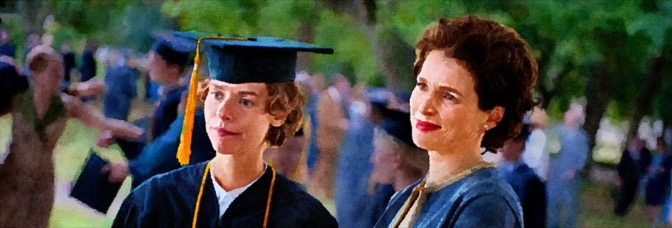The best thing about Temple Grandin is Claire Danes’s performance. She even gets through the parts where she’s thirty playing fifteen. It’s a biopic, there a lot of flashbacks. Director Jackson tries to use a lot of visual transitions for them, but they really succeed because of the teleplay and the performances. To give some credit to Jackson though, it’s not like there’s a lot of de-aging attempts. Temple Grandin’s stylistically simple, but Jackson does seem to understand Danes is the whole show and do everything he can to facilitate her performance.
In a way, having Danes portray the character or is it person when talking about a biopic–anyway. Having her play in the flashbacks forces the viewer to think about the actor, think about her performance. Jackson’s so bland, you’re not even considering it as a creative choice. Instead, the film creates another narrative track. Where’s Danes performance going?
Christopher Monger and Merritt Johnson’s teleplay has a lot of detail, but not a lot of exposition. The information dumps are sudden and big. There’s barely any time spent enjoying or appreciating. It’s functionally fluid, pragmatically plotted.
Then sometime in the second half, after all the flashbacks are done, Julia Ormond–playing Danes’s mother–comes back into the film. Even though Ormond and Danes don’t have any relaxed scenes together for the first third at least, gradually–after Ormond is off-screen for a bit–it becomes clear there’s a similar performance. Danes’s performance is off Ormond’s performance. And then when they’re together more often in the second half, there’s so much more of it to see. It’s really cool and, you know, phenomenal acting.
David Strathairn’s great as Danes’s mentor. Catherine O’Hara’s good as her aunt (and Ormond’s sister). They’re both functional parts, but Strathairn gets a lot more to do. By the second act, O’Hara’s only around to tell Ormond what Danes is doing or not doing. Like I said, it’s a functional film. Very functional.
There aren’t any other standouts in the supporting cast because there aren’t many distinct characters. There are likable caricatures and unlikable ones. No one has a role so much as a function–give Danes something good to play off. And they all do.
Temple Grandin is an superior television biopic. (It’s not TV, it’s HBO). But Danes, Ormond, and even Strathairn and O’Hara could’ve done a lot more if they’d had an ambitious director. Still, Jackson does understand how to showcase his actors. So the performances don’t suffer, they just deserve the same level of filmmaking. And, like any biopic, it helps the real Temple Grandin’s got a terrific life story.

Leave a Reply